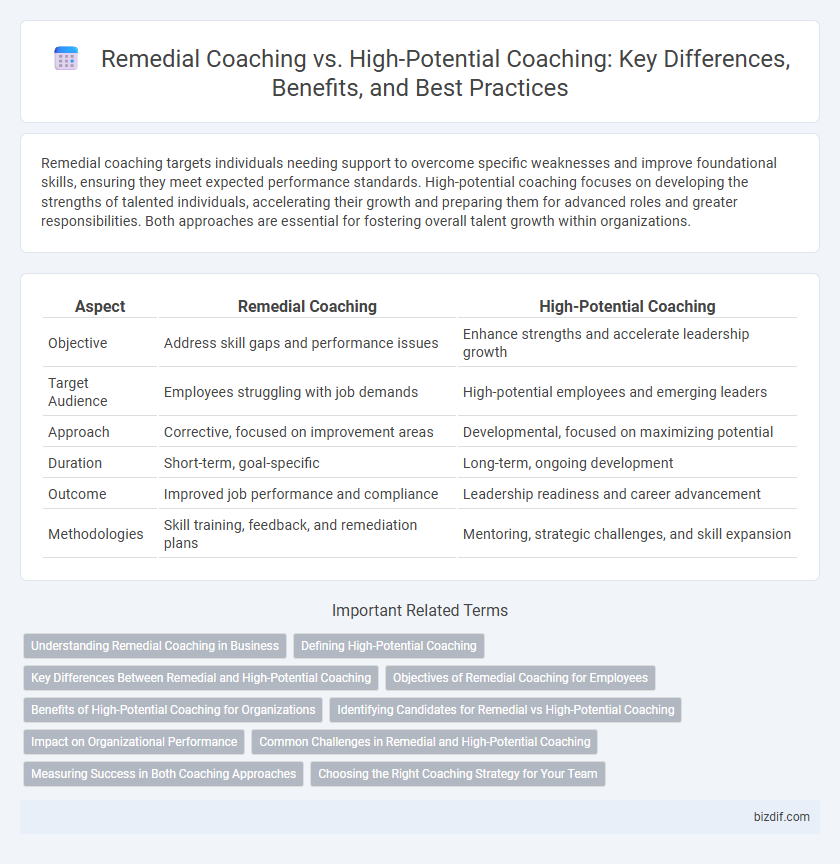Remedial coaching targets individuals needing support to overcome specific weaknesses and improve foundational skills, ensuring they meet expected performance standards. High-potential coaching focuses on developing the strengths of talented individuals, accelerating their growth and preparing them for advanced roles and greater responsibilities. Both approaches are essential for fostering overall talent growth within organizations.
Table of Comparison
| Aspect | Remedial Coaching | High-Potential Coaching |
|---|---|---|
| Objective | Address skill gaps and performance issues | Enhance strengths and accelerate leadership growth |
| Target Audience | Employees struggling with job demands | High-potential employees and emerging leaders |
| Approach | Corrective, focused on improvement areas | Developmental, focused on maximizing potential |
| Duration | Short-term, goal-specific | Long-term, ongoing development |
| Outcome | Improved job performance and compliance | Leadership readiness and career advancement |
| Methodologies | Skill training, feedback, and remediation plans | Mentoring, strategic challenges, and skill expansion |
Understanding Remedial Coaching in Business
Remedial coaching in business targets employees who struggle with specific skills or performance gaps, aiming to bring them up to the required competency level. It involves structured interventions focused on addressing weaknesses and improving fundamental capabilities essential for job success. This approach contrasts with high-potential coaching, which develops future leaders identified for advanced responsibilities and strategic roles.
Defining High-Potential Coaching
High-potential coaching targets individuals identified as having the capacity for significant future leadership or advanced roles, focusing on enhancing strengths and accelerating development. Unlike remedial coaching, which addresses specific performance gaps or weaknesses, high-potential coaching emphasizes leveraging innate talents and expanding strategic skills. This approach often includes personalized growth plans, mentorship, and challenging assignments to prepare high-potential employees for critical organizational responsibilities.
Key Differences Between Remedial and High-Potential Coaching
Remedial coaching targets employees who require support to overcome skill gaps and improve performance, emphasizing troubleshooting and foundational development. High-potential coaching focuses on nurturing talented individuals for future leadership roles, aiming to enhance strategic thinking and amplify existing strengths. The key differences lie in their objectives, with remedial coaching addressing deficiencies and high-potential coaching accelerating growth and leadership readiness.
Objectives of Remedial Coaching for Employees
Remedial coaching targets employees struggling with specific performance gaps, aiming to improve skills and correct behaviors that hinder their productivity. Its primary objective is to bring underperforming employees up to the company's standard, ensuring they meet essential job requirements effectively. This type of coaching focuses on addressing deficiencies, boosting confidence, and enhancing overall competence to prevent further performance issues.
Benefits of High-Potential Coaching for Organizations
High-potential coaching accelerates leadership development by identifying and nurturing future key contributors, resulting in improved succession planning and talent retention. Organizations investing in high-potential coaching experience enhanced employee engagement, increased innovation, and stronger team performance. This targeted approach drives sustainable growth by aligning individual capabilities with strategic business objectives.
Identifying Candidates for Remedial vs High-Potential Coaching
Identifying candidates for remedial coaching involves assessing performance gaps, skill deficiencies, and immediate developmental needs to support employees struggling with current role demands. High-potential coaching targets individuals demonstrating strong leadership qualities, rapid learning capabilities, and strategic thinking essential for future organizational growth and succession planning. Utilizing performance appraisals, 360-degree feedback, and behavioral assessments ensures accurate differentiation between remedial needs and high-potential attributes.
Impact on Organizational Performance
Remedial coaching targets skill gaps and underperformance, enabling employees to meet baseline standards and reducing errors that hinder productivity. High-potential coaching accelerates leadership development, fostering innovation and strategic thinking that drive competitive advantage. Organizations investing in high-potential coaching experience higher employee engagement and long-term performance growth compared to those focusing solely on remedial interventions.
Common Challenges in Remedial and High-Potential Coaching
Common challenges in remedial coaching include overcoming learners' lack of confidence, addressing gaps in foundational knowledge, and motivating individuals who struggle with persistent performance issues. High-potential coaching often faces obstacles such as managing elevated expectations, preventing burnout, and balancing skill enhancement with leadership development. Both coaching types require tailored strategies to effectively foster growth while navigating individual resistance and goal alignment.
Measuring Success in Both Coaching Approaches
Measuring success in remedial coaching involves tracking improvements in specific skill gaps, enhanced performance metrics, and increased confidence levels in previously weak areas. High-potential coaching success is assessed through leadership development indicators, accelerated career progression, and the ability to take on complex challenges effectively. Both approaches rely on continuous feedback, tailored performance evaluations, and achieving defined developmental milestones to ensure impactful outcomes.
Choosing the Right Coaching Strategy for Your Team
Remedial coaching targets employees who need skill improvement or performance correction, emphasizing personalized support and clear development plans to address specific gaps. High-potential coaching focuses on grooming future leaders by enhancing strategic thinking, leadership abilities, and advanced competencies critical for organizational growth. Selecting the right coaching strategy depends on assessing individual and team needs to align coaching objectives with business goals effectively.
Remedial Coaching vs High-Potential Coaching Infographic

 bizdif.com
bizdif.com